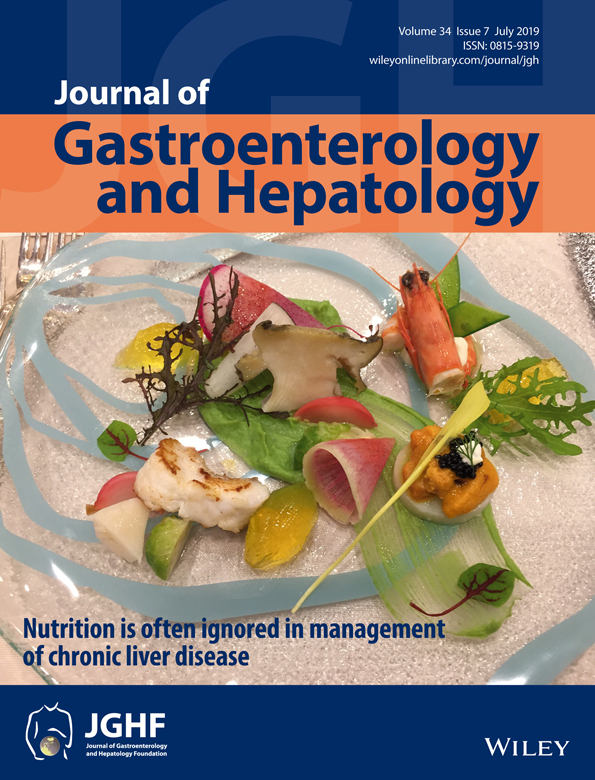Nutrition is often ignored in management of chronic liver diseases
Patients with liver cirrhosis are in the distinct energy status. The hepatic energy consumption is constitutively high even in the resting phase, and the ability to metabolize carbohydrates is reduced. As a result, a cirrhotic liver is always in a negative balance of energy consumption. Substantial numbers of cases with Child–Pugh Stages B and C cirrhosis are malnourished.1 In the cirrhotic patients, malnutrition increases risk of complications which include portal hypertension, ascites, and hepatorenal syndrome. Malnutrition significantly reduces overall survival2 and the prognosis following liver transplantation.3 Thus, it is important to treat malnutrition of liver cirrhosis to decrease liver complications and to improve survival. In the present issue of the Journal of Gastroenterology and Hepatology, Chen et al. reported results of meta-analysis of studies which investigate the effects of the late evening snack (LES) on liver function in patients with cirrhosis.4 Recent studies of the effect of nutritional managements for cirrhotic patents on their quality of life and life prognoses include the following.
Late evening snack
As an intervention for energy malnutrition, frequent meals or LES has been recommended for cirrhosis patients. There have been several RCTs on LES in cirrhotic patients. However, due to heterogeneity in the patient backgrounds and allocation methods, their evidence levels were limited. In this issue, Chen et al. conducted meta-analysis of eight published randomized control comprising 341 patients (167 in LES groups and 174 in control groups) and controlled clinical trials to evaluate the effects of LES on patients with cirrhosis.4 The eight studies demonstrated that LES intervention had significant effects for liver biochemical parameters such as albumin, ammonia and prothrombin time, serum AST, and ALT. Studies on clinical signs of liver dysfunction showed lower occurrence rates of ascites and hepatic encephalopathy than in the control group. On the other hand, LES had no significant benefit on Child–Pugh score. The overall results of the meta-analysis indicated that having LES can improve liver function reserve for patients with liver cirrhosis, with or without hepatocellular carcinoma. This is the first meta-analysis on the LES for cirrhotic patients and may provide the best evidence for the benefit of evening meals.
Branched chain amino acids
It has been reported that amino acid imbalance is present in cirrhosis patients. The Fisher's ratio of branched chain amino acids (BCAA) to aromatic amino acids (AAA) is decreased in cirrhosis. BCAAs are the main source of energy consumption in the liver as well as in the muscle. There are numerous papers on the effects of BCAA supplementation on hepatic encephalopathy, liver function, overall survival, quality of life, prevention of liver-related complication, and hepatocarcinogenesis. BCAA treatment for patients with hepatic encephalopathy showed improvement in neuromuscular physiological function but no effects on its recurrence.5, 6 Supplementation of BCAA leads to significant increase in albumin concentration in patients with cirrhosis with serum albumin of less than 3.5 g/dL.7, 8 In addition, BCAA significantly suppressed development of hepatocellular carcinoma in patients with compensated cirrhosis, although not in patients with decompensated cirrhosis.9 Long-term administration of BCAA for up to 2 years decreased hepatic events in decompensated cirrhosis and suppressed hepatocarcinogenesis.10
L-carnitine
L-carnitine (l-b-hydroxy-g-N-trimethylaminobutyric acid) is an amino acid derivative and an essential nutrient for the beta-oxidation of fatty acid in the mitochondria. Carnitine can be absorbed from food in a normal diet, but it can be synthesized in liver and kidney. For this reason, carnitine tends to be insufficient in people who are diet-restricted or who are on dialysis for chronic renal failure. Most cirrhotic patients are in the status of carnitine deficiency. Carnitine deficiency causes hepatic steatosis, hepatomegaly, hyperammonemia, skeletal myopathy, and cardiomyopathy. More severe carnitine deficiency causes serious damage to liver, brain, heart, and kidney and causes coma due to hypoglycemia, encephalopathy due to hyperammonemia, cardiomyopathy, and anemia as a result of renal failure. Therefore, supplementation with carnitine may also be important in cirrhotic patients who are under chronic carnitine deficiency. Several reports have documented that L-carnitine supplementation resulted in restoration of hyperammonemia and improvements in muscle cramp symptoms in cirrhosis patients.11, 12 In addition, supplementation of carnitine improved liver steatosis and fibrosis in subjects with nonalcoholic steatohepatitis (NASH).13 It is recently reported that long-term supplementation of L-carnitine suppressed loss of skeletal muscle mass (sarcopenia) in patients with cirrhosis.14
In conclusion, nutritional management, particularly late evening snack, BCAA, and L-carnitine directly and indirectly improve quality of life and prognosis in cirrhotic patients. Benefit of nutritional supplement is underestimated and ignored by clinicians. Further studies are mandatory to establish clinical evidences of nutritional managements as prognostic indicators for end-stage liver disease.




